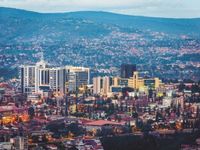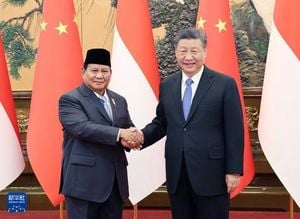In mid-August 2025, Rwanda quietly welcomed a group of seven migrants deported from the United States, marking the first arrivals under a new and controversial agreement between the two nations. The move comes as part of President Donald Trump’s intensifying campaign to deport undocumented migrants from the U.S.—a campaign that has drawn both domestic and international scrutiny, not least for its reliance on so-called "third-country" deportations to nations with which migrants often have no personal connection.
According to the Associated Press, Yolande Makolo, spokesperson for the Rwandan government, confirmed that "the first group of seven vetted migrants arrived in Rwanda in mid-August." The identities and nationalities of the deportees have not been disclosed by either government. What is clear, however, is that the arrangement could see up to 250 migrants transferred from the U.S. to Rwanda in the coming months, with Kigali retaining the right to decide who is ultimately admitted. The deportees are currently housed by an international organization, with oversight from the International Organization for Migration (IOM) and Rwandan social services.
Makolo explained, "Three of the individuals have expressed a desire to return to their home countries, while four wish to stay and build lives in Rwanda." She added that those who choose to remain will be provided with workforce training, healthcare, and accommodation support. "Regardless of their specific needs, all of these individuals will receive appropriate support and protection from the Rwandan government," Makolo told pro-government news outlet The New Times, as reported by BBC.
Rwanda is not alone in accepting U.S. deportees. It joins Uganda, Eswatini, and South Sudan as African nations that have signed similar agreements with Washington. In July 2025, eight men were deported to South Sudan, while five others were sent to Eswatini, where, according to AFP, they are reportedly being held in solitary confinement. Legal challenges and protests have erupted in response, with human rights advocates expressing deep concern about the fate of deportees sent to countries with questionable human rights records.
The Trump administration’s embrace of third-country deportations has been met with fierce criticism from rights groups and legal experts. Critics argue that sending migrants and asylum seekers to unfamiliar countries exposes them to significant risks, including torture or other abuses, and deprives them of meaningful opportunities to contest their removals. As highlighted by News24, some have gone so far as to call the practice “flagrantly unlawful,” pointing to cases where deportees had little chance to research their destination or seek legal counsel before being placed on flights.
These concerns are not just theoretical. The U.S. Supreme Court, in a sharply divided decision, recently allowed the deportation of eight men to South Sudan, despite objections from several justices who warned there was no evidence the deportees would be safe. In their dissent, the justices wrote, "The affected class members lacked any opportunity to research South Sudan, to determine whether they would face risks of torture or death there, or to speak to anyone about their concerns."
Rwanda’s willingness to participate in such transfers is rooted, at least in part, in its own history. As Makolo told the BBC, "Nearly every Rwandan family has experienced the hardships of displacement, and our societal values are founded on reintegration and rehabilitation." The Rwandan government has previously taken in refugees and asylum seekers under international agreements, including a deal with the UN and African Union that saw nearly 3,000 refugees evacuated from Libya between 2019 and 2025. Many of those refugees have since been resettled elsewhere, according to the UN.
But Rwanda’s image as a safe haven is not without controversy. Human rights organizations have repeatedly raised alarms about the country’s own record, including allegations of political repression and its alleged backing of rebel groups in neighboring Democratic Republic of Congo—a charge Kigali has consistently denied. The Trump administration, for its part, recently touted a peace deal it brokered in June 2025 between Rwanda and the DRC, framing it as a step toward regional stability. Yet, as BBC notes, critics question whether the agreement addresses the underlying issues fueling conflict in the region.
The financial details of the U.S.-Rwanda deportation deal remain unclear. While the British government paid Rwanda £240 million ($310 million) for a now-abandoned plan to send UK asylum seekers there, it is not known what—if any—financial incentives are tied to the current U.S. arrangement. Rwanda has set parameters for whom it will accept: no child sex offenders, and only those with no criminal background or who have completed their sentences.
This latest move is just one piece of a larger, rapidly evolving immigration policy under President Trump’s second term. After campaigning on a promise to undertake the “largest deportation operation” in U.S. history, Trump has signed legislation allocating billions of dollars to expand detention centers and hire additional immigration officials. His administration has also approached other countries—including Panama and El Salvador—to accept deported migrants, sometimes in exchange for financial compensation. In El Salvador, hundreds of Venezuelan deportees were held in the notorious Terrorism Confinement Centre (CECOT), where human rights abuses have been documented.
Despite these efforts, the practice of third-country deportations remains deeply divisive. Advocates argue that it treats African nations as “dumping grounds” for migrants who have often already served their sentences or have no criminal records. The Rwandan government, meanwhile, maintains that it is acting out of solidarity, drawing on its own experience of displacement to offer support to others in need.
As the first group of deportees begins to navigate life in Rwanda—or, for some, prepares to return to their countries of origin—the world will be watching closely. The fate of these individuals, and the future of the U.S.-Rwanda deportation agreement, will serve as a test case for the ethics and efficacy of third-country deportations in a world grappling with unprecedented migration flows and political polarization.
For now, what is certain is that the story of these seven migrants is far from over. Their journey, and the broader debate it has sparked, underscores the complex intersection of immigration policy, international law, and human rights on the global stage.






